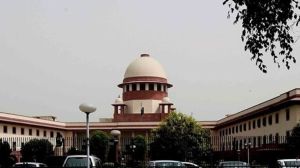The Supreme Court bench considering the Ayodhya title suit Friday said it will hear arguments on whether the entire matter needs to be referred to a larger bench.
During earlier hearings in the matter, the bench had said it was willing to only consider whether the court’s 1994 decision in the Ismail Faruqui vs Union of India case should be referred to a Constitution bench. In that ruling, the Supreme Court had held that “a mosque is not an essential part of the practice of the religion of Islam…” and “accordingly, its acquisition is not prohibited by provisions in the Constitution of India”.

The three-judge bench, headed by Chief Justice of India Dipak Misra, told senior advocate Raju Ramachandran, who appeared for the Muslim side, that its March 14 interim order in which it said will consider the question of referring the Ismail Faruqui judgment to a larger bench “will not possibly close our hands”.
The hearing will resume April 27.
The CJI said this when Ramachandran drew the bench’s attention to the March 14 order and said when he had then raised the demand for referring the Ayodhya matter to a larger bench, the judges had described his submission as “very ambitious” and said it “will consider his request at an appropriate stage”.
The day’s hearing also witnessed high drama with senior advocate Rajeev Dhavan, who has raised the demand for referring the Ismail Faruqui judgment to a larger bench, questioning the court’s recent decision to send a petition challenging polygamy among Muslims for hearing to a Constitution Bench and sought to know why it had not adopted a similar approach to his plea. He said the entire Ayodhya matter ought to be sent to a larger bench.
His contention was that a bench headed by the CJI had decided to straightaway send the polygamy petition to a Constitution Bench while telling him that it will first hear him and the other side before deciding whether or not to send the Ismail Faruqui judgment to a larger bench.
Dhavan dared the court to explain to the nation if polygamy is more important to it than his plea against the 1994 judgment.
Story continues below this ad
This was opposed by senior advocate K Parasaran, appearing for the Hindu side, who said “he is trying to intimidate the judges”. A slanging match followed while the bench, which also comprised Justices Ashok Bhushan and S Abdul Nazeer, watched.
READ | Togadia on Ram Temple: Why agitate if judicial process is followed?
Pressing his demand, Dhavan said the 1994 decision had influenced the judgment of the Lucknow bench of the Allahabad High Court in the title suit case. In September 2010, the High Court split it among three parties, awarding a third each to the Nirmohi Akhara sect, the Sunni Central Wakf Board, UP, and Ramlalla Virajman. The challenge to this order is now before the Supreme Court.
“It (Ayodhya case) is the single most important issue that affects Indian secularism today, far more than polygamy… This particular paragraph 82 (of the 1994 judgment where it has been laid down that a mosque is not an essential part of the practice of Islam) has influenced the judgment (Ayodhya title suit). The shadow of Faruqui has fallen on the Lucknow bench… This case is going to shake the country one way or other,” he said.
Story continues below this ad
Referring again to the court’s approach in the polygamy petition, Dhavan asked “why did your lordships take an identical part that is against the Muslim community and say it should go to a Constitution Bench… keeping in view the importance of this matter, it should be placed before a Constitution Bench… I am anguished… It’s a serious anguish… Your lordships think polygamy is more important than this?”
His comments led to protests from senior advocate Tushar Mehta, appearing for the UP government. Mehta said there was a trend of some members of the bar trying to vitiate the atmosphere in courtrooms: “Who are you (Dhavan) to suggest to the court?”. But Dhavan would not back down. “I want the people of India to know…. the press is here too… please tell,” he told the bench.
The first 45 minutes of the hearing, which started 2 pm, saw angry exchanges between Dhavan and senior advocates Parasaran, C S Vaidyanathan, Mehta and Maninder Singh. At one point when the bench tried to calm him down, Dhavan told the judges: “I’m showing respect, but you are not standing here (in my place) to listen to the rubbish (of the other side).”
Parasaran objected to Dhavan’s choice of words and asked the bench to ensure decorum in the courtroom. Dhavan countered, saying Parasaran was “caricaturing” his arguments.

 The first 45 minutes of the hearing, which started 2 pm, saw angry exchanges between Dhavan and senior advocates Parasaran, C S Vaidyanathan, Mehta and Maninder Singh.
The first 45 minutes of the hearing, which started 2 pm, saw angry exchanges between Dhavan and senior advocates Parasaran, C S Vaidyanathan, Mehta and Maninder Singh.






